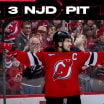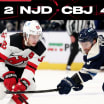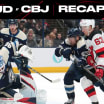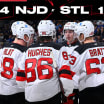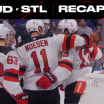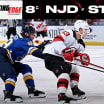The funny thing about the Stanley Cup playoffs - then and now - is that hockey's version of baseball's World Series often turns grunt players into heroes.
In 1936, the longest playoff game, Montreal Maroons vs. Detroit Red Wings, lasted into a sixth overtime period. The decisive goal was scored by an obscure, part-time Detroit player, Modere (Mud) Bruneteau.
Likewise in 1950, when the Red Wings won the title again, the Motor City hero was another afterthought forward, Pete Babando. He beat the New York Rangers in double-overtime of Game 7.
So, as the second period of Game 7 - Devils-Rangers, 1994 - opened at Madison Square Garden, the score remained tied, 0-0, and the game as even as the scoreboard said.
Meanwhile, Devils coach Jacques Lemaire hoped that he could find a Bruneteau or Babando in his lineup to tilt the game his way. Jacques knew that there were a few who might fill the bill.
Game 7's Frantic Regulation Finish | SUNDAYS WITH STAN
The Devils miraculously tied the dramatic Game 7 with just 7.7 seconds remaining in regulation to force overtime
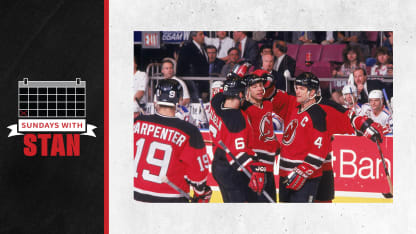
sundays with stan
DEVILS-RANGERS, 1994 EASTERN FINAL
Part 9: The Start of the Greatest Game
Part 8: 'One Hell of a Third Period'
Part 7: Happy Half of Game 6
Part 6: Prelude to Game 6 Melodrama
Part 5: The Devils' Offensive
Part 4: Ultra Suspenseful Game 3
Part 3: Can the Devils Do It Again!?
Part 2: Devils Upset Rangers in Game 1
Part 1: Prelude to the Historic Series
"I had three guys who really came together as linemates," Lemaire recalled. "It was Bobby Holik centering for Randy McKay and Mike Peluso. They were all big boys and they were good.
"Matter of fact, they were so good, nobody called them 'Fourth-liners' anymore. Our writers named their unit the 'Crash Line.' I had no issues putting them out there with the best the Rangers had to offer."
Mike Peluso: "Our line's job was to wreak havoc out there; to intimidate and to try to create turnovers. We brought energy to our teammates and physically punished the Rangers whenever we got the chance.
"Not only did we go out there and hit guys, but we also drew a lot of penalties. Those were big momentum swingers, and we looked for that stuff. We were well-rounded and had a good plus-minus rating."
As the second period unfolded with neither team able to score, it had become apparent to the Garden crowd that, yes, the Devils were what the scoreboard proclaimed; the equal of the Blueshirts.
"We were a team that year," John MacLean remembered. "We were close and we genuinely liked each other. It was a total team effort. Everybody contributed, regardless of his role.
"But we were not a team of superstars like the Rangers. From top to bottom we were a very good hockey team, though, just a lot of solid players."
What transpired in the pivotal second period was a compelling comparison of the two leaders; Mike Keenan and Lemaire, and their contrasting personalities and coaching strategy.
On the Rangers side there were rumblings that the Blueshirts would rather follow the lead of captain Mark Messier than coach Keenan, whose turbulent personality off-putted some Rangers.
To a man, on the other side, the Devils had total faith in Lemaire. In retrospect, I can recall many players - Bobby Holik in particular - who called Lemaire the best coach they ever had. Defenseman Bruce Driver was one.
Driver: "Jacques was a player's coach. You had to play both ends of the rink with Jacques, and you had to be accountable. He was the perfect combination of being a motivational guy as well as a teacher.
"Jacques had a plan, and he needed everybody to buy into that plan, no matter what. Yet he was always willing to listen to suggestions that the players made. And that was another reason why we respected him."
The one thing Lemaire couldn't do was get out on the ice and orchestrate the game as he did as a player when the Montreal Canadiens had a dynasty late in the 1970s.
Meanwhile, Keenan was doing his thing again, changing lines. It worked early in the second period as Stephane Matteau corralled the puck behind the Devils net. He spied Esa Tikkanen whose one-timer just barely was stopped by Martin Brodeur.
Save after save were being made at both ends and still no score. It was the same thing with the penalty timekeeper; not a single infraction had been called by the game officials.
Six minutes into the period, Holik gave the crowd conniptions. Peluso hit Bobby with a perfect pass forcing Mike Richter to make the save of the game so far.
ESPN analyst Bill Clement called it a steal of a save. "The best of the last four games," said Clement.
The game's first breakthrough took place just past the half-way mark of the period. It began with Messier winning the draw from Jim Dowd and then Adam Graves took Mark's pass.
Brian Leetch, who was stationed at the right point, yelled for the rubber and got it. With a half-second surveying of the scene, Leetch sprinted along the right boards and behind Brodeur's net.
Bill Guerin sensed the move and tried to intercept Leetch. But the defenseman jammed on the brakes, executed a pirouettewhich shook both Guerin and defenseman Scott Stevens.
Brodeur was hugging the right post but somehow, Leetch's wraparound found air between the goaltender's pads. It was the move of a Hall of Famer and it depressed the Devils to no end. Rangers 1, Devils 0.
The Blueshirts were souped-up and pressed hard for a second goal. A Devils penalty gave them their chance but this time the New Jersey defense was impenetrable
Suffused with new confidence, now the Devils went on the attack as Guerin intercepted a New York pass. Billy had Jim Dowd with him and Valeri Zelepukin flanking the duo.
"I thought I had Richter this time," said Billy G, "but Mike managed to hold on to the puck and then - after the whistle - he fell backward into the net."
The "close-but-no-cigar" play left the Devils still trailing by a goal as the second period buzzer sounded.
As the Garden Staters galumphed to their dressing room, one of them was heard to remark to his teammates, "It's only one goal and we got a whole period to get it - GO DEVILS!"
---
There were 20 minutes remaining for a Devils comeback.
It was the start of period three, Game 7, Rangers ahead 1-0 and goalie Mike Richter could have had 'Formidable" as his middle name.
Martin Brodeur wasn't too bad either at the other end.
Completing his first full season in the National Hockey League, the likeable French-Canadian was fast becoming a folk hero in New Jersey. The difficulty, in this case, is that about 18,000 Garden fans wanted him to fail.
As the third period unfolded, the Rangers worked hard to grant their fans' wishes. Sure enough, the Blueshirts created a dangerous 2-on-1. Sergei Nemchinov and Greg Gilbert vs. Scott Niedermayer.
"I thought we had him," said Gilbert who found an opening between the Devils defenseman's legs for an accurate pass and what appeared to be an easy tap in for the rushing Russian.
But Brodeur read the play, sliding knees first to nurse the puck out of harm's way. Now it was the Rangers turn to disrupt any New Jersey counterattacks so they stole a page from Lemaire's defensive book.
They trapped, turning center ice into a bumpy road. The strategy became a priority when Alexei Kovalev was whistled off for some rough stuff in front of his net but New Jersey proved inept with the man advantage.
The Devils wasted what could have been their last major advantage but they were unbowed; Billy Guerin in particular. Using his speed along with the equally fleet Tom Chorske, they almost had one.
"I saw Billy flying in," Chorske remembered, "and tried to put him in the clear. My pass got him free but Richter stopped his backhand."
Guerin returned for more assaults forcing Richter to bend, but not break. At one point, Mike's scoreless streak had climbed to 91:30 minutes. Undaunted, the Devils continued the push.
What impressed the press row gang was how Jacques Lemaire stayed with his game plan; defense first produces offense in turn. It was, in fact, to be New Jersey's trademark as long as Marty was in goal.
But the minutes dwindled down to a precious few and the score stayed the same. Finally, Jim Dowd won a faceoff from Mark Messier while Lemaire - from the bench - signaled Brodeur to speed to the bench.
Battle On The Hudson Author Tim Sullivan: "Tension, torment, passion, pride - it was all out there for everyone to see. This classic series, one that already was being mentioned among the best ever, was in its final minute."
With six skaters on the ice, the Garden Staters were pulling out all stops for the winner. On the other side, the faithful hit all chords demanding defense.
As their time tank emptied, Bruce Driver created a healthy chance for Nicholls but Richter stopped Bernie's wrister forcing a stoppage in play. That left 18.6 seconds on the clock.
Rangers hulking defender Jeff Beukeboom's clearing attempt was stopped at the blue line by Driver who moved the puck to Stephane Richer.
"Richer set the stage for the most fitting, frantic regulation finish to the NHL's Greatest Series Ever that anyone could have dreamed up," wrote Tim Sullivan.
The Devils had created a scramble around Richter who was on his knees trying to find the piece of gold. But Valeri Zelepukin had found it first and managed to get it behind Richter's left skate and over the goal line.
Only 7.7 seconds remained on the clock.
From the Rangers side, the reactions varied from astonishment to utter depression. Blueshirts broadcaster called it a form of cruel and unusual punishment.
Rose: "It was a dagger to the heart when Zelepukin scored. Now it was a whole 'One more hill to climb' thing. I had a pen in my hand and just disgustedly flung it into the air and figured, 'Well, it wasn't an expensive pen.' When I let it go I never imagined that I'd see it again."
What Rose - consumed by fury - neglected to notice was what remains to this day one of the most controversial calls in sports history.
Furious over Zelepukin's goal. Furious over referee Bill McCreary's earlier quick whistle and furious over the official's "failure" to blow his whistle when Richter thought he had smothered the puck, Richter rose in anger.
The Rangers goalie charged at McCreary who was standing behind the net and pushed the referee against the boards.The physical assault at the very least should have cost Richter a "Roughing" penalty.
Realistically, he, then and there tossed Richter out of the hockey game. Physical assault against a referee could not - should not - have gone unpunished.
But it did and - unfairly to the Devils - permanently altered the hockey game. Compounding the felony, years later, McCreary admitted that he then told Richter, "You owe me one."
Wrong!
McCreary owed the Devils one and he blew it. No doubt he knew then and 10, 20, 30 years after.
That was the bad news for the Devils. The good news was that they still were alive and sudden-death overtime loomed.




